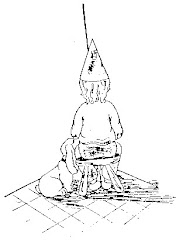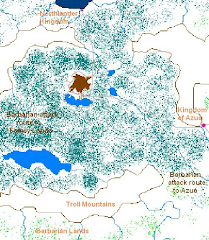I can't wait. I have to say something about Tavaar now or I'll bust. I won't tell everything, because I'd use up all my blog space. But the truth is, the only character with more words written about them than Tavaar is Khirsha - and that's because he is the main character.
Tavaar is my favorite supporting character. Through her, I learned more about The Great Sea than even writing about Khirsha. I think that is because, being so much older than Khirsha, she allowed me to fill in Khirsha's backstory. She has a very colorful backstory, herself. I will provide a few excerps from the journal writings. (NOTE: These are from First Drafts. I may do a little quick editing while I transcribe, but I'll probably leave them rough.)
Black writing is current. Purple writing is journals comments, and deep red is actual journal entries.
Here are a few bios: Tavaar was born in the year 296 on Seeday Intumen 4 to Taylich and Odelmaar. She was the couple's fifth child, but only the third who lived. The first two children, a girl and then a boy, died in their first year. Tavaar belonged to Mines, which was one of three lines opposing Defense and Sword's hold on Head-of-Family. She lived in Gahrem Village, Mines chief village. Her grandfather was village Sachem (mayor), and her father would become Mines Sovereign. Her grandmother was a strict and powerful woman, feared and respected by everyone.
Tavaar literally began as a ‘nothing’ character. Originally, she didn’t even have a name. She was FM225, and so she remained for a number of years. She was nameless – and heartless – as were all of Odelmaar’s children. Pulich was named first. He became important when he became Shello’s main opposition for Head-of-Family . But Tavaar remained nameless. She was not important. Yet.
The reference to FM225 reveals how I named background characters in Khirsha's family. There are nearly seven thousand members spanning 352 years. (I have subsequently given everybody a real name. That took years.) The first character indicated gender. The second character identified the generation. The number was a gender counter within a generation. So, to interpret Tavaar's original name: 225th female in the 14th generation.
Tavaar got her name when I realized something had to happened in Gahrem Village. Who did Khirsha meet? What was said and done? The intention was to portray her as ‘dark’, and possibly even ‘evil’, like Pulich. However, when Khirsha began to interact with Tavaar, she became a surprise. Suddenly, her character became important. At first, I didn’t recognize it. However, when she and Khirsha kissed in the garden, I found myself walking an unknown path. I wasn’t sure what was going to happen next. That Khirsha and Tavaar would meet again was clear. What happened when they did was an even bigger surprise. Suddenly, Tavaar had become part of the war between Madatar and Shatahar. She could not be left in Gahrem.
I realized I had to learn more about Tavaar. How had she become the poster child for wanton behavior? How good was she with a flamesword? (Originally, not very.) But in writing her back story, I discovered only Shello, Khaiu, and maybe Klarissa were better in her own generation. Outside her generation, there was Khirsha and Kelso, of course, and possibly Abrin and Kordahno. So, I began writing what I expected to be a few chapters depicting Tavaar’s life growing up in Gahrem Village. I wound up spending the next six months devoting nearly all of my writing to Tavaar. I filled several journals. I found myself falling in love with Tavaar. Such is the way of all good friendships. They begin innocently and build one step at a time. Through Tavaar, I learned to appreciate Odelmaar and his motivation. He was no longer just an evil sovereign. I know Tavaar well. I like her. I understand her pain. I think it may be mine.
Tavaar taught me to see my characters in new light. After Tavaar, there were no more 'good' characters and 'bad' characters - regarding Free People anyway. There were reasons why characters did 'bad' things. Reasons which made sense, and explained them perfectly. Further, 'good' characters now began to show their faults. Everybody started to become real. I think that's why I love Tavaar so. She showed me who everybody is.
Tavaar had one extremely close friend: Sashwa. Tavaar's relationship with Sashwa was similar to Khirsha's with Kelso. They were also near cousins and also grew up in the same house. Sashwa was also older, but only by a year. I've written a lot about the love the two women bore each other. So much that the question came up: are they gay?
The long answer is that Khirsha, Kelso, Tavaar and Sashwa lived in a different place and time. It was a different culture which accepted – and encouraged - behavior we might question, or label. Kissing was an accepted form of communication – even between rivals and enemies. Khirsha and Kelso differed from Tavaar and Sashwa because of gender. As females, Tavaar and Sashwa were dominant in relationships, which allowed them great latitude of freedom. But there was more to it. Being different people, they showed love in different ways. Sashwa loved to tease Tavaar. Tavaar was beautiful. Her reactions encouraged Sashwa to continue, and even escalate. Was there anything behind the teasing? Officially, at the time of this writing, I can honestly state I know of no tale which goes beyond jest - beyond dreams. That is the long answer. The short answer is: No. But they did love each other.
Here is the actual beginning of Tavaar's story, from The Birth of a Girl.
She was born in the year 296, as years were reckoned within the family. She was a late child, nine years junior to her nearest sibling, and the only surviving daughter. A beautiful baby, who from the first was alert to her surroundings, Tavaar was lavished with attention and doted upon like a precious and fragile statuette.
Yet her beauty, which was considerable, only served to mask her intelligence, wit and tremendous physical strength and skill. In after years, many wondered how she could have remained unnoticed for so long. 1The heaviest blame was placed upon her father, Odelmaar, for he was seen as a difficult man. Others cast shadows at her mother, Taylich. After all, Taylich was the final voice in Tavaar’s early years. Then, of course, there was the family line into which Tavaar had been born: Mines. Mines tended to minimize the role of their women and exalt their males. Perhaps this was because, as miners, physical strength mattered more for them. 2This argument is shaken by the fact of Tavaar’s tremendous strength. Despite her sleek and elegant stature, Tavaar was stronger than most males, retaining this power well past the age when weakness and frailty became the curse of those who still live.
Tavaar grew up with the finer things. Mines was a wealthy line and the house of Odelmaar-Taylich was wealthy within Mines. Servants were commonplace, and Tavaar learned at an early age the place of the Unaligned. She observed carefully as her father, mother and two older brothers directed servants. 3Of the four, it seems amazing to report that Odelmaar was the best with servants. Although not recognizing any type of social or family equality, he did not go out of his way to be disdainful and abusive. Taylich could be most unfair. For this reason, complaints were brought to Odelmaar.
The brothers were worse than unfair. They were outright abusive, particularly as they neared and passed age twenty. Pulich was the worst, but Ovaer was redeemed only because he compared favorably to his older brother. Tavaar’s quick and attentive eyes missed little.
To her credit, Tavaar’s approach with servants was akin to her father’s. 4She neither required from, nor offered to, emotional displays of any kind. She did not criticize small mistakes and recognized accidents for what they were. On those occasions where discipline was needed, Tavaar doled it without fanfare or heat. What was, was. There was no debate and no allowance given for self-justification. She merely stated the crime and the consequences. Those under her authority learned quickly that to argue with, or challenge in any way, Tavaar’s decision was to commit a new offense. Yet Tavaar did not punish to excess. Her decisions, while hard, were appropriate.
An often criticism of Tavaar, and for years it was certainly so, was she did not overtly acknowledge overt effort. All efforts performed by servants were viewed as being within their general responsibility of ‘serving’. However, it must also be said that Tavaar commanded the greatest loyalty, surpassing both her mother and her father. Some attribute this to Tavaar’s beauty, which was considerable, and perhaps with the males this may have been so. But Tavaar was not a replica of her father. Whereas Odelmaar tended to look upon the Unaligned as naturally inferior, Tavaar did not. To Tavaar, they were people who had a job to do.
Tavaar is remembered by many as a distant person who was difficult to get close to. From her late-twenties to mid-fifties this was certainly so. Tavaar’s social interactions were extremely limited – a choice of her own making. She devoted her life to her garden, her military skills, 5her role as secondary hostess to her mother, her tasks within her line, and especially, her children.
But as a young girl, Tavaar had plenty of social energy and drive. She began mock sword training at five and 6secretly began training with steel at nine. She was the best of her age, proving it by winning the sword competition at age eight. At age nine she would compete again and find herself facing someone who was destine to play an important role in her life: 7Shello. She would lose their battle and weep bitterly over the defeat. When Pulich, who was twenty, sought to tease her, she threw caution to the wind and attacked her brother in a vicious sword fight she could not hope to win – at nine. Still, her fury and quickness kept her brother on the defensive until Taylich intervened and scolded Pulich for fighting with someone so young. Odelmaar said nothing, being too taken with amazement to speak. He, alone, had seen what no other saw: Tavaar was already better than her renowned brother. Her skills were raw, but they were there.
The small numbers in bold represent footnotes. Each journal entry began with a comment section, followed by the narrative, and finished with footnote comments.
Saturday, December 20, 2008
Subscribe to:
Post Comments (Atom)
Today's Music
Yeah. That's The Great Sea all right.







No comments:
Post a Comment